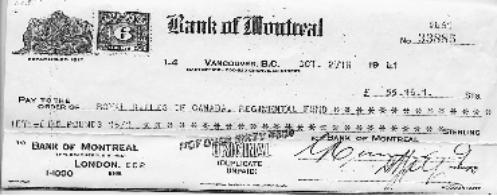Hugh A
Hugh A claimed to have been a labour organizer. His head was bald and covered with scars which he said were the result of encounters with those "reactionary bastards" affiliated with management.
Hugh was an excitable fellow, quick to anger and positive in his approach to any problem. He was a good bridge player, and he often joined in a game in the corner of our hospital hut.
One day we were playing between two bunks, north and south seated on the bunks and east and west on wooden stools between them.
Reg Taylor, a nervous fellow, was seated on a bunk beside one of us, when suddenly, and without warning, an American fighter plane zoomed low over the camp and loosed a burst of machine gun fire at the docks across the cove from the camp.
Everyone dived for cover, and Reg, in his haste to get to safety, hooked his foot in Hugh's stool and upended him into the corner.
Hugh came up with a roar, fists clenched, and ready to punch out the "reactionary" who had abused his dignity!
How these unimportant and mundane incidents amused us and stayed in our memory at a time when so little occurred to occupy our minds, gives some indication of the uneventful life we lived in ShamShuiPo.
Mental Illness
That not more of us cracked under the strain of confinement, starvation, abuse, disease, and emotional distress, is something that amazes me and is witness to the strength of character of the Canadians in ShamShuiPo.
Perhaps I was one of the more fortunate. Other than my parents back home and my brother and sisters all of whom were able to take care of themselves, I had no emotional ties that affected me personally.
But consider the man who perhaps had a wife and children in Canada, living on army allowances, lonely, beset by temptations of many kinds, and prone to yield to those temptations.
Thoughts of home and the fears that these temptations might cause the loved one to falter, must have entered the nightmares of the married man.
One man who had cracked, and had tried to end it all by slashing his wrists, was brought into our hospital hut in the middle of the night. He was difficult for us, who at that time were scarcely able to wobble around, to hold him and prevent him from doing more harm to himself.
I am happy to report that he recovered and got back home. However, I have heard faint rumours that he had some mental problems later in life.
Another of our fellows broke down so severely that he used to howl at the full moon shining in through his window. This was distressing to all of us, because he was a fellow that everyone liked.
One night he became so agitated that he undertook to walk home. He got as far as the guard house, where the guards put him in a cell, and called for us to go and get him.
The Japanese guards seemed to have a fear of mentally disturbed people. When his rescuers got there, the guards were peeking fearfully into the cell, and were reluctant to go near their prisoner.
Doc Savage, who was perhaps the most frail among us, maintained that our "patient" was a gentleman, because, in sparring with Doc, he strictly observed the Marquis of Queensbury Rules!
This man also survived the prison camps and returned home, but I have heard that he also had mental problems after leaving the service.
There were others as well who became depressed and retreated into themselves. However, the daily struggle to survive, to wonder what next would be around the corner, to look forward to one's turn to get "burnt rice", kept most of sane until that happy day when we gained our freedom once more.
As a footnote, I should tell you that "burnt rice" was the crust that formed inside the cooking pot, and was a little more palatable than the soggy mass that was otherwise dished out.
Overdue Payment
In 1941, when we left to go to Hong Kong, our commanding officer placed a total of 260 Pounds Sterling in a safety deposit box in the Hong Kong-Shanghai Banking Corporation.
This fund had been established to purchase extras, such as badges and other insignia. After the war it had been forgotten.
 In 1995, Captain Lionel Hurd, who had been Regimental Quartermaster, and one of
his acquaintances in the banking business, uncovered the oversight, and together
they were able to follow the trail to a successful conclusion.
In 1995, Captain Lionel Hurd, who had been Regimental Quartermaster, and one of
his acquaintances in the banking business, uncovered the oversight, and together
they were able to follow the trail to a successful conclusion.
The result was that Lionel and his friend were able to retrieve the money. $538.71, the Canadian equivalent of the original deposit, and $1636.71, representing the interest, was turned over to Lionel's care by the Bank of Montreal in Lionel's home town, Sawyerville, Quebec.
The Bank of Montreal then hosted a dinner for the Hong Kong Veterans of the area, and Lionel turned over the money to the Quebec-Maritimes Branch of the Hong Kong Veterans Association.
The copy of the cheque noted here represents one step in the total transaction. This action on Lionel's part is typical of his service to the men in his sphere of responsibility, and his dedication to the trust placed in him.